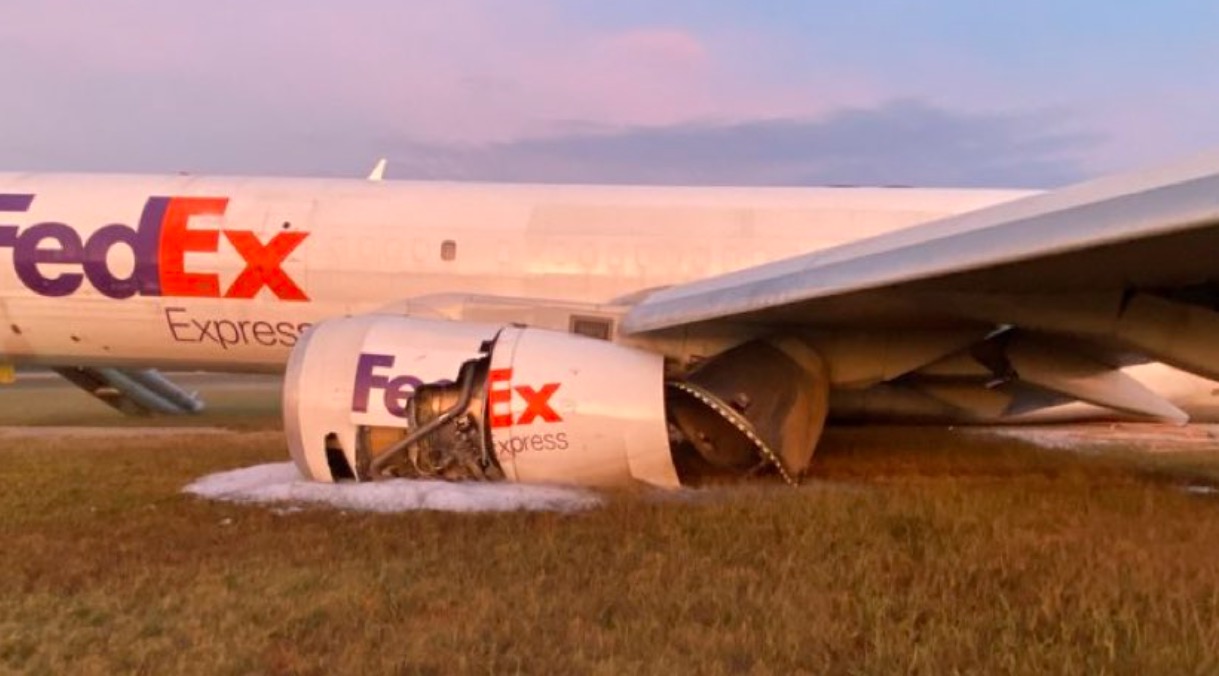FedEx Cargo Plane Makes Emergency Landing Following Bird Strike and Engine Fire: A Close Call for Air Travel
On January 20, 2023, a FedEx cargo plane made an emergency landing in Texas after experiencing a bird strike and engine fire. The incident highlights the risks and challenges faced by air cargo operators, and the importance of adhering to safety protocols to prevent such close calls. In this article, we will delve into the details of the incident, and explore the potential causes, consequences, and implications for the air cargo industry.
The FedEx Express aircraft, a Boeing 767-300F, was on a routine flight from Louisville, Kentucky to Fort Worth, Texas when it encountered a severe bird strike. The bird strike, also known as bird strike or bird collision, occurs when a bird collides with an aircraft, causing damage to the plane's engine or other critical systems. In this case, the bird strike led to a loss of engine power, resulting in an emergency landing at Dallas Love Field.
According to the Federal Aviation Administration (FAA), bird strikes are a major safety concern for the aviation industry. In 2020, the FAA reported 9,421 bird strikes on US airport runways, resulting in 12 fatalities and 60 injuries. The risks associated with bird strikes are further compounded by the fact that birds can carry diseases such as avian influenza, which can pose a threat to human health.
Potential Causes of the Bird Strike
While the exact cause of the bird strike that led to the engine fire is not yet known, several factors could have contributed to the incident. These include:
- Poor weather conditions, such as strong winds or fog, which can make it difficult for pilots to spot birds in the air.
- Insufficient air traffic control guidance, which can lead to pilots deviating from established flight paths.
- Lack of bird strike reporting, which can make it difficult to identify areas where birds are most likely to be present.
Consequences of the Engine Fire
The engine fire that occurred on the FedEx cargo plane was a critical factor in the emergency landing. The fire, which was likely caused by the bird strike, would have compromised the plane's engine performance, making it difficult to maintain altitude and airspeed.
- Immediate Danger: The engine fire posed an immediate danger to the lives of the crew and passengers on board.
- Airworthiness: The fire could have compromised the airworthiness of the aircraft, making it difficult to safely transport cargo.
- Regulatory Implications: The incident highlights the need for robust safety protocols and regulations to prevent similar incidents from occurring in the future.
Implications for the Air Cargo Industry
The incident highlights the importance of adhering to safety protocols and regulations to prevent similar incidents from occurring in the future. The air cargo industry is highly regulated, with strict guidelines in place to ensure the safe transportation of cargo.
- Regular Maintenance: Airlines and cargo operators must ensure that their aircraft are regularly maintained to prevent mechanical failures.
- Pilot Training: Pilots must receive regular training on bird strike procedures and emergency response protocols.
- Safety Protocols: Airlines and cargo operators must have robust safety protocols in place to respond to emergency situations.
Conclusion
The incident involving the FedEx cargo plane that made an emergency landing following a bird strike and engine fire highlights the risks and challenges faced by air cargo operators. The incident underscores the importance of adhering to safety protocols and regulations to prevent similar incidents from occurring in the future. By prioritizing safety, the air cargo industry can minimize the risks associated with bird strikes and engine fires, and ensure the safe transportation of cargo.
Key Takeaways:
- Bird strikes are a major safety concern for the aviation industry.
- Poor weather conditions, insufficient air traffic control guidance, and lack of bird strike reporting can contribute to bird strikes.
- Engine fires can compromise the airworthiness of an aircraft, posing an immediate danger to the lives of the crew and passengers on board.
- Robust safety protocols and regulations are essential to preventing similar incidents from occurring in the future.
Future of Air Cargo Safety:
- The air cargo industry must prioritize safety, adhering to regulations and guidelines to prevent bird strikes and engine fires.
- Regular maintenance, pilot training, and safety protocols are essential to minimizing the risks associated with bird strikes and engine fires.
- The development of new technologies, such as bird strike detection systems, can help to reduce the risks associated with bird strikes.
Did Piddy Passed Away
Helmut Newton Famous Pos
Nateilver Net Worth
Article Recommendations
- How Tall Is Brad Pitt
- Imoo Jung Relationships
- Taylor Mathisd
- Kaitlan Collins Boyfriend
- Damon Imani Who Is He
- Jorja F
- Annalee Thomas
- Josh Harriseadliest Catch
- Wentworth Miller
- Kai Trumppeech Issue



